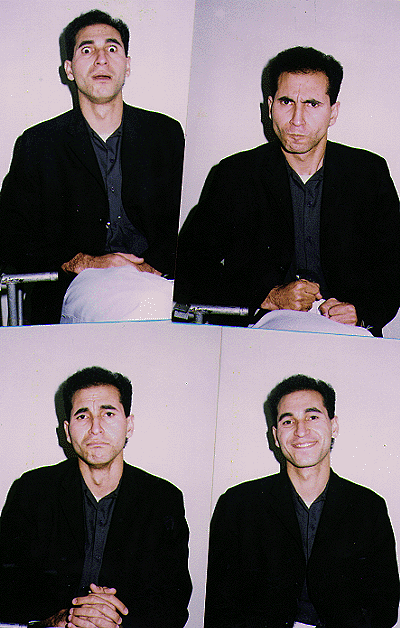

As soon as I walked into his tiny apartment, Hamid turned on the TV. It was a Japanese cartoon dubbed in Turkish. His satellite dish, hidden behind the balcony wall to avoid detection by the authorities, could only tune into four channels from neighboring Turkey.

"The other night I watched three films with Sophia Loren. You should hear how she sounds in Turkish," he laughed.
Yeah. It was Turkish TV and he didn't understand a word. But it was the only thing he looked forward to when he got home from work. That and Whitney Houston's "Bodyguard" album.
I met Hamid Farrokhnejad five years ago at Tehran University, where he was studying theater. The immediate attraction was his hilarious sense of humor and, of course, the fact that we were both Abadanis. (Although, I was shown the customary frown for being from the wrong side of town -- the exclusive Bereym area, where oil company executives had their villas.)
Today Hamid is a struggling theater director, trying to make ends meet with odd jobs in theater, film and TV. His wife, Forouzan, who also studied theater, is an arts teacher at a junior high school. Soon Hamid has to start his two-year military service.
They worry about their bills and especially the money they owe on their "one-bedroom" apartment, a 50-square meter shoebox off Motahari (ex-Takht-e Tavous) Avenue which they bought two years ago for about 5 million tomans.
Forouzan said they couldn't invite friends over as often as they would like because they couldn't afford to feed them in a respectable way. A few days later they had two couples over and served them khoresh qeymeh with tuna sandwiches. My daughter Mahdiyeh and I showed up too.

Hamid practicing a play at Tehran University, 1991.They looked back at the good old days when they were classmates at Tehran University. Then there was a reality check and talk shifted to how to make money and the latest price of the dollar. And of course there was considerable discussion and debate on favorite shows on Turkish TV. They all agreed with Hamid, however, that Turkish women sing with a deep voice and the men tend to be more delicate.
We laughed uproariously when Hamid played the "I Will Always Love You" video from the film "Bodyguard" and pretended to be Kevin Costner trying to protect Whitney from an assassin's bullet. In slow motion, mouth and eyes wide open, Hamid stretched out in front of Forouzan, grabbed his wounded chest, wobbled his knees and fell to the floor.
That wasn't the first time I heard "Bodyguard" songs in his apartment. Every time I went over, he would put on the "Bodyguard" and listen in super high volume. He would tell me how beautiful Whitney, and her voice, were as I worried about the neighbors, and, in fact, the whole neighborhood, complaining. But there was no knock on the door or banging against the walls.
When Whitney wasn't hollering, Hamid asked about life in America.
"So, tell me, what do you do over there?" he asked. Several times. I didn't know what to say: "This and that. Work. Nothing really."
He desperately wanted me to confirm his view that life in America is almost heaven. No. Heaven itself. But I couldn't. I couldn't watch him salivate even as I described my own day-to-day problems in the U.S. of A.
Maybe if I had lived in, say Alabama, I could cook up something about the Ku Klux Klan burning Iranian flags on my front lawn. Or the flood destroying my home in Mississippi. The L.A. earthquake could have been dramatic too. But I live in New York. I could have said, "I was jogging in Central Park one night . . . " But I hadn't moved a muscle for months and I couldn't recall any men being raped there.
